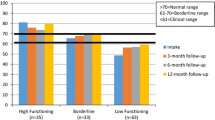Abstract
The Massachusetts Mental Health Services Program for Youth (MHSPY) is a home-based clinical intervention that seeks to maintain youth with severe functional impairment in the community via delivery of integrated primary care, mental health, substance abuse, and social services. Using blended public agency funding, traditional and nontraditional services are provided within a private, not-for-profit, managed care organization. Individualized, comprehensive care plans are developed by an MHSPY care manager, who works intensively with the family and the Care Planning Team to identify needs and resources. Data on clinical functioning are collected at baseline and every six months during the program. Service utilization and cost are measured on a quarterly basis. Family, youth, and agency satisfaction ratings are collected at disenrollment. Aggregate analyses based on four years of data show that MHSPY participants have improved clinical functioning, including significant reduction in risk to self and others. They also experience reduced service utilization and cost and high rates of family satisfaction.



Similar content being viewed by others
References
Knitzer J. Unclaimed Children: The Failure of Public Responsibility to Children and Adolescents in Need of Mental Health Services. Washington, DC: Children's Defense Fund; 1982.
Stroul BA, Friedman RM. A System of Care for Severely Emotionally Disturbed Children and Youth. Washington, DC: Georgetown University Child Development Center, National Technical Assistance Center for Children's Mental Health; 1986.
Stroul BA. Children's Mental Health: Creating Systems of Care in a Changing Society. Baltimore, MD: Paul H. Brookes Publishing Co; 1996.
VanDenBerg J, Grealish M. Individualized services and supports through the wraparound process: Philosophy and procedures. Journal of Child and Family Studies. 1996;5:7–21.
Saxe L, Cross T. National Program Report: 1998–1999 in Robert Wood Johnson Foundation Anthology, Chapter 9. Available at: http://www.rwjf.org/health/anthologies/1998chap9.htm. Accessed December 3, 2002.
Burns BJ. Mental health service use by adolescents in the 1970s and 1980s. Journal of the American Academy of Child and Adolescent Psychiatry. 1991;30:144–150.
Cole R. Project Design Workshop for a Special Purpose System of Care for Children with Serious Emotional Disturbances and their Families. Washington, DC: U.S. Department of Health and Human Services, Center for Mental Health Services, Washington Business Group on Health; 1995.
Hodges K. Use of the child and adolescent functional assessment scale (CAFAS) as an outcome measure in clinical settings. Journal of Behavioral Health Services Research. 1998;25(3):325–336.
Schoenwald SK, Henggeler SW, Brondino MJ, Rowland MD. Multisystemic Therapy: Monitoring treatment fidelity. Family Process. 2000;39:83–103.
Achenbach TM. Manual for the Child Behavior Checklist/4–18 and 1991 Profile. University of Vermont, Burlington, VT. 1991
Dunst CJ, Trivette CM, Deal AG, eds. Supporting and Strengthening Families: Methods, Strategies and Practices. Vol. 1. Cambridge: Brookline Books; 1984.
Shaffer D. A children's global assessment scale (CGAS). Archives of General Psychiatry. 1983;40:1228–1231.
Grimes K. Child Patient Assessment Tool. Harvard Community Health Plan, Boston, MA; 1990.
Bickman L. A continuum of care: More is not always better. American Psychologist. 1996;51(7):689.
Bickman L, Noser K, Summerfelt WT. Long-term effects of a system of care on children and adolescents. Journal of Behavioral Health Services & Research. 1999;26(2):185–202.
Acknowledgments
We wish to thank the Massachusetts Executive Office of Health and Human Services and NHP for their active partnership on this initiative and the US Department of Health and Human Services/Maternal and Child Health Bureau for funding support. Many thanks, as well, go to Allison Appleton and Katherine Frankman for their hours of help in research activities and manuscript preparation.
Author information
Authors and Affiliations
Corresponding author
Additional information
Brian Mullin, BA, is a Senior Data Analyst at Neighborhood Health Plan, 253 Summer St., Boston, MA 02210, USA.
Rights and permissions
About this article
Cite this article
Grimes, K.E., Mullin, B. MHSPY: A Children's Health Initiative for Maintaining At-Risk Youth in the Community. JBHSR 33, 196–212 (2006). https://doi.org/10.1007/s11414-006-9013-7
Published:
Issue Date:
DOI: https://doi.org/10.1007/s11414-006-9013-7




